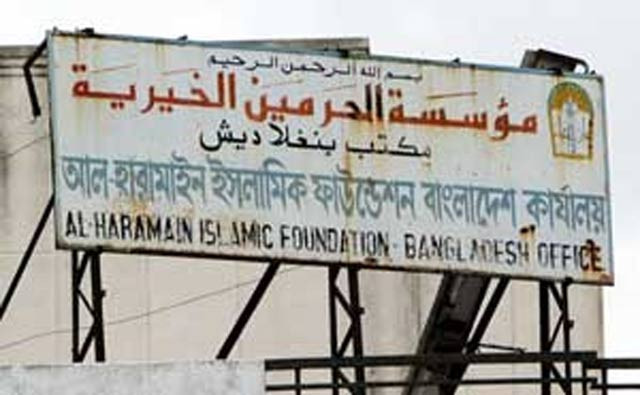US removes defunct Saudi-linked American charity from blacklist
Allegations about Saudi Arabia's role in funding terrorism have come under renewed focus this year

A sign on top of the Al Haramains Islamic Foundation's four-story office building in Bangladesh. PHOTO: AFP
The US decision in 2004 to blacklist the Oregon-based Al Haramain Islamic Foundation sparked a legal battle in which the charity's lawyers accused the government of hiding behind classified evidence and national security claims to shut down a legitimate charity.
10 most generous nations in the world
The case, and others in the years after the September 11, 2001 attacks on the United States, concerned civil liberties advocates, who accused the US government of using overly broad authorities, opaque procedures and secret evidence to close Islamic charities.
According to court records, lawyers for Al Haramain realised the government was monitoring legally privileged communications with their client when the government accidentally gave them a Top Secret document related to the surveillance.
A Treasury spokesperson said in a statement on Friday that its Office of Foreign Assets Control delisted Al Haramain's US branch after the charity had agreed to dissolve. Foreign branches of Al Haramain, including in Somalia, Bosnia and Kenya, remain on the blacklist.
The decision is "an acknowledgement that there was no basis to designate them in the first place," said Lynne Bernabei, a lawyer for the organisation.
Saudi officials had no immediate comment on the Treasury decision, but Riyadh has said that it has cracked down on terrorism finance.
Allegations about Saudi Arabia's role in funding terrorism have come under renewed focus this year. In July, Congress released a long-classified section of the official report on the September 11 airplane attacks, describing potential links between some of the hijackers and Saudi officials.
The report said information from the Federal Bureau of Investigation showed "the al-Haramain Islamic Foundation (HIF) has clear ties to the Saudi Government, and intelligence reporting suggests it is providing financial and logistical support to al Qaeda."
US reveals suspicions of Saudi ties to 9/11
The report said Al Haramain had established a US office in Oregon in 1993, which it said received about $700,000 from parent offices in Saudi Arabia.
The US government froze the Oregon charity's assets in February 2004 pending investigation, and later named it a "specially designated global terrorist," blacklisting it in September 2004 and claiming it was a US branch of the Saudi organisation.
The Oregon charity's lawyers argued it was not a subsidiary of any other organisation, but did distribute publications and receive donations from the Saudi charity.
The lawyers argued that the government had refused to provide the charity with specific charges or a summary of the classified evidence it claimed to have, and failed to provide probable cause before it froze the group's assets.
A US appeals court found in 2011 that the government had enough evidence to blacklist the Oregon charity, but had violated the group's due process rights by not disclosing the evidence against it and failing to provide reasons for its investigation.
A spokesperson for the Justice Department did not immediately respond to a request for comment.



















COMMENTS
Comments are moderated and generally will be posted if they are on-topic and not abusive.
For more information, please see our Comments FAQ